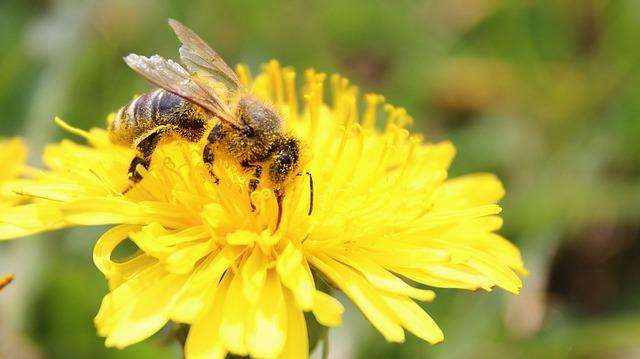(单词翻译:单击)
听力文本
This is Scientific American — 60-Second Science. I'm Christopher Intagliata.
Honeybees are the charismatic microfauna of the pollination world. But flies, bumblebees, butterflies and moths—they all pollinate, too. With varying degrees of success. The poorer ones are technically referred to as 'inefficient pollinators.' "Those that do visit but transfer very little pollen in their visit." Florian Schiestl, an evolutionary biologist at the University of Zurich.
Schiestl and his colleague grew field mustard plants, and exposed them to two types of pollinators: efficient bumblebees and inefficient hoverflies. After just 11 generations, they found that the plants visited by bumblebees were taller, twice as fragrant, and reflected more UV light—a visual signal for bees. And those factors made the progeny even more attractive to bumblebees at the end of the experiment: a sign the plants had adapted to their pollinators' preferences.
But the plants that got a fly-by from the flies? They grew shorter. Less fragrant. And actually adapted to do more self-pollination. Because hoverflies are lousy pollinators. The study is in the journal Nature Communications.

So with honeybees in peril, what happens if we lose them? "This will trigger an evolutionary response in the plants. For example, if flies take over as more important pollinators, as they used to be in the past, then very likely we'll have some evolutionary change going on."
And if the change is self-pollination, that could be trouble. "Self-pollination leads to reduction of genetic variability in the population, and this can be a problem for the plants, because they have a reduced ability to evolve resistance against diseases." Meaning that if we lose the pollinators, it's the plants' genomes that may go to seed.
Thanks for listening for Scientific American — 60-Second Science Science. I'm Christopher Intagliata.
参考译文
这里是科学美国人——60秒科学。我是克里斯托弗·因塔利亚塔。
蜜蜂是授粉界具有非凡魅力的微型动物。但是苍蝇、大黄蜂、蝴蝶以及飞蛾也可以传粉。不过它们的授粉成功率不同。从技术上讲,成功率低者被称为“低效授粉者”。“这些动物造访花朵,但是在造访过程中的传粉数量非常少。”弗洛里安·斯奇特尔是苏黎世大学的进化生物学家。
斯奇特尔和同事种植了荠菜田,并让两种授粉者为其授粉:一种是高效的大黄蜂,另一种是低效的食蚜蝇。他们发现,仅经过11代以后,被大黄蜂造访过的植物就长得更高,香气也增加了一倍,同时反射出了更多的紫外线——对蜜蜂来说这种紫外线是一种视觉信号。在实验最后,这些因素使得后代植物对大黄蜂更具吸引力:这一信号表明植物已经适应了其授粉者的偏好。
那由食蚜蝇授粉的植物呢?这些植物长得更短,香气也更淡。实际上,它们更多地适应了自花授粉。因为食蚜蝇是糟糕的传粉者。这项研究结果发表在《自然通讯》期刊上。
现在蜜蜂处在危险境地,如果失去蜜蜂会发生什么?“那会引发植物的进化反应。举例来说,苍蝇接替蜜蜂成为更重要的授粉者,那我们很可能会看到植物经历进化改变。”
如果这种变化是自花授粉,那可能会有麻烦。“自花授粉会导致植物种群遗传变异性减少,而这对植物来说是个问题,因为这样一来它们进化出的抵抗疾病的能力就会降低。”这表明,如果我们失去了授粉者,那植物的基因组可能也会退化。
谢谢大家收听科学美国人——60秒科学。我是克里斯托弗·因塔利亚塔。
译文为可可英语翻译,未经授权请勿转载!
重点讲解
重点讲解:
1. adapt to 适应;
例句:The world will be different, and we will have to be prepared to adapt to the change.
世界会变得不同,我们必须做好准备以适应其变化。
2. take over 接替;接任;接手;
例句:My idea is letting her take over my work.
我的想法是让她接替我的工作。
3. used to do sth. 过去常常;过去曾;
例句:He used to be one of the professors at the School of Education.
他曾是教育学院的一名教授。
4. go on 进行;发生;
例句:I don't know what's going on.
我不知道发生了什么事。


